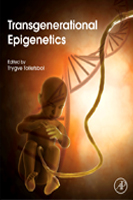Transgenerational Epigenetics
Current Volumes In The Translational Epigenetics Series
To find out more about the current and forthcoming volumes in the Translational Epigenetics series, click on any links to the right!
If you are interested in being a volume editor for a book in the Translational Epigenetics series, please read the Information for prospective Translational Epigenetics Volume Editors on this website and contact series editor Trygve Tollefsbol, at Trygve@uab.edu.
Transgenerational Epigenetics
Edited by: Trygve O. Tollefsbol, University of Alabama at Birmingham
Director of the Cell Senescence Culture Facility, Birmingham, AL, USA

Description
Transgenerational Epigenetics provides a comprehensive analysis of the inheritance of epigenetic phenomena between generations. Recent research points to the existence of biological phenomena that are controlled not through gene mutations, but rather through reversible and heritable epigenetic processes.
Epidemiological studies have suggested that environmental factors may be heritable. In fact, environmental factors often play a role in transgenerational epigenetics, which may have selective or adverse effects on the offspring. This epigenetic information can be transferred through a number of mechanisms including DNA methylation, histone modifications or RNA and the effects can persist for multiple generations.
This book examines the evolution of epigenetic inheritance, its expression in animal and plant models, and how human diseases, such as metabolic disorders and cardiovascular diseases, appear to be affected by transgenerational epigenetic inheritance. It discusses clinical interventions in transgenerational epigenetic inheritance that may be on the horizon to help prevent diseases before the offspring are born, or to reduce the severity of diseases at the very earliest stages of development in utero, and current controversies in this area of study, as well as future directions for research.
Key Features
- Focused discussion of metabolic disorders, cardiovascular diseases and longevity, which appear most affected by reversible and heritable epigenetic processes
- Encompasses both foundational and clinical aspects including discussions of preventative in utero therapies
- Covers history, future outlook, disease management and current controversies
Readership
Graduate students researching the fundamental basis of epigenetics to therapeutic interventions into epigenetic-based disorders
Table of Contents:
- Transgenerational Epigenetics
- Historical Perspective of Transgenerational Epigenetics
- Epidemiology of Transgenerational Epigenetics
- Metastable Epiallels
- Paramutations
- Epigenetic Silencing of Transgenes
- Epigenetic Inheritance of Repeat Sequences
- Histone-mediated Transgenerational Epigenetics
- Heritable Generational Effects Through RNA
- Animal Models of Transgenerational Epigenetic Effects
- Plant Models of Transgnerational Epigenetic Inheritance
- Transgenerational Epigenetic Effects in Plants
- Maternal Epigenetic Inheritance
- Paternal Epigenetic Inheritance
- Evolution of Transgenerational Epigenetic Inheritance
- Heritable Epigenetics Over Multiple Generations
- Maternal Stress Effects on Transgenerational Epigenetics
- Preimplantation Environment and Epigenetic Transgenerational Inheritance
- Transgenerational Epigenetic Inheritance and Human Disease
- Environmental Transgenerational Epigenetic Effects
- Transgenerational Epigenetics of Endocrine Disruptors
- Effects of Transgenerational Epigenetics on Longevity
- Transgenerational Epigenetic Effects of an Environmental Enrichment on Memory Formation
- Dietary Effects on Transgenerational Epigenetic Inheritance
- Clinical Applications of Transgenerational Epigenetics
- Transgenerational Epigenetics: Current Controversies
- Future Directions of Transgenerational Epigenetic Research
Available now from Store.Elsevier.com